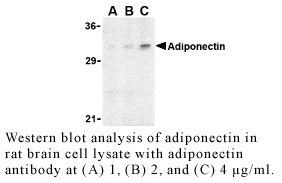Anti-Human Adiponectin (NT)
Data
- -
- -
Antibody DetailsProduct DetailsReactive Species Human Host Species Rabbit Immunogen Purified Recombinant Human Adiponectin (>98%) Product Concentration 0.5 mg/ml Formulation This polyclonal antibody is formulated in phosphate buffered saline (PBS) pH 7.4 containing 0.02% sodium azide as a preservative. Storage and Handling This polyclonal antibody is stable for at least one week when stored at 2-8°C. For long term storage, aliquot in working volumes without diluting and store at –20°C in a manual defrost freezer. Avoid Repeated Freeze Thaw Cycles. Country of Origin USA Shipping Next Day Ambient RRIDAB_2828081 Each investigator should determine their own optimal working dilution for specific applications. See directions on lot specific datasheets, as information may periodically change. DescriptionSpecificity Rabbit Anti-Human Adiponectin recognizes an epitope near the N-terminus of Human, Mouse and Rat Adiponectin. This polyclonal antibody was purified using affinity chromatography. Background Adiponectin, also known as Acrp30, is an adipocyte-derived protein with wide ranging paracrine and endocrine effects on metabolism and inflammation. It is induced during adipocyte differentiation, and its secretion is stimulated by insulin. It promotes adipocyte differentiation, fatty acid catabolism, and insulin sensitivity and is negatively correlated with obesity, type 2 diabetes, and atherogenesis. In this context, Adiponectin is an anti-inflammatory agent, but it exerts pro-inflammatory effects in nonmetabolic disorders such as rheumatoid arthritis and inflammatory bowel disease. Adiponectin interacts with the receptors AdipoR1 and AdipoR2, calreticulin, and Cadherin-13/T-Cadherin, as well as with several growth factors. Mature human Adiponectin shares 83% and 85% amino acid (aa) sequence identity with mouse and rat Adiponectin, respectively. The glycosylation of four hydroxylated lysine residues in the collagenous domain is required for the intracellular formation of HMW complexes. The various multimeric forms of Adiponectin exhibit distinct tissue specific and gender specific profiles and activities.
PN:A278 is applicable as a control peptide for blocking antibody binding in Western blotting. Antigen DetailsPubMed References & Citations1. Fantuzzi, G. (2005) J. Allergy Clin. Immunol. 115:911 2. Rota, PA. et al. (2003) Science 300:1394 3. Wong, GW. et al. (2004) Proc. Natl. Acad. Sci. USA 101:10302 4. Li, W. et al. (2003) Nature 426:450 Technical Protocols |
Related Products
- -
- -
Prod No. | Description |
|---|---|
A268 | |
A269 | |
A355 |
 Products are for research use only. Not for use in diagnostic or therapeutic procedures.
Products are for research use only. Not for use in diagnostic or therapeutic procedures.



